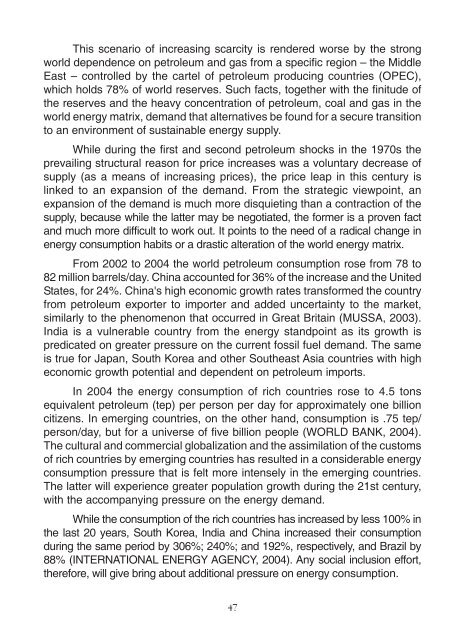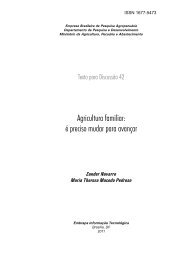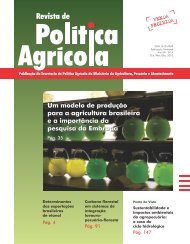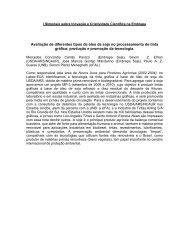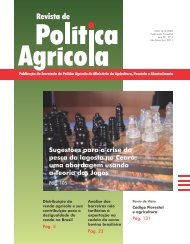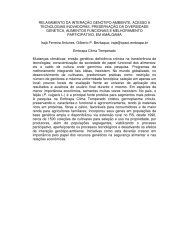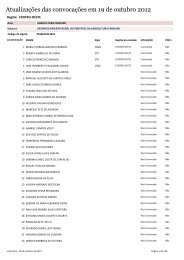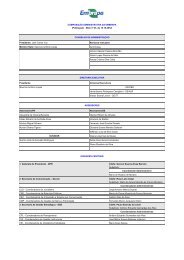Ministry of Agriculture, Livestock and Food Supply - Embrapa
Ministry of Agriculture, Livestock and Food Supply - Embrapa
Ministry of Agriculture, Livestock and Food Supply - Embrapa
Create successful ePaper yourself
Turn your PDF publications into a flip-book with our unique Google optimized e-Paper software.
This scenario <strong>of</strong> increasing scarcity is rendered worse by the strong<br />
world dependence on petroleum <strong>and</strong> gas from a specific region – the Middle<br />
East – controlled by the cartel <strong>of</strong> petroleum producing countries (OPEC),<br />
which holds 78% <strong>of</strong> world reserves. Such facts, together with the finitude <strong>of</strong><br />
the reserves <strong>and</strong> the heavy concentration <strong>of</strong> petroleum, coal <strong>and</strong> gas in the<br />
world energy matrix, dem<strong>and</strong> that alternatives be found for a secure transition<br />
to an environment <strong>of</strong> sustainable energy supply.<br />
While during the first <strong>and</strong> second petroleum shocks in the 1970s the<br />
prevailing structural reason for price increases was a voluntary decrease <strong>of</strong><br />
supply (as a means <strong>of</strong> increasing prices), the price leap in this century is<br />
linked to an expansion <strong>of</strong> the dem<strong>and</strong>. From the strategic viewpoint, an<br />
expansion <strong>of</strong> the dem<strong>and</strong> is much more disquieting than a contraction <strong>of</strong> the<br />
supply, because while the latter may be negotiated, the former is a proven fact<br />
<strong>and</strong> much more difficult to work out. It points to the need <strong>of</strong> a radical change in<br />
energy consumption habits or a drastic alteration <strong>of</strong> the world energy matrix.<br />
From 2002 to 2004 the world petroleum consumption rose from 78 to<br />
82 million barrels/day. China accounted for 36% <strong>of</strong> the increase <strong>and</strong> the United<br />
States, for 24%. China's high economic growth rates transformed the country<br />
from petroleum exporter to importer <strong>and</strong> added uncertainty to the market,<br />
similarly to the phenomenon that occurred in Great Britain (MUSSA, 2003).<br />
India is a vulnerable country from the energy st<strong>and</strong>point as its growth is<br />
predicated on greater pressure on the current fossil fuel dem<strong>and</strong>. The same<br />
is true for Japan, South Korea <strong>and</strong> other Southeast Asia countries with high<br />
economic growth potential <strong>and</strong> dependent on petroleum imports.<br />
In 2004 the energy consumption <strong>of</strong> rich countries rose to 4.5 tons<br />
equivalent petroleum (tep) per person per day for approximately one billion<br />
citizens. In emerging countries, on the other h<strong>and</strong>, consumption is .75 tep/<br />
person/day, but for a universe <strong>of</strong> five billion people (WORLD BANK, 2004).<br />
The cultural <strong>and</strong> commercial globalization <strong>and</strong> the assimilation <strong>of</strong> the customs<br />
<strong>of</strong> rich countries by emerging countries has resulted in a considerable energy<br />
consumption pressure that is felt more intensely in the emerging countries.<br />
The latter will experience greater population growth during the 21st century,<br />
with the accompanying pressure on the energy dem<strong>and</strong>.<br />
While the consumption <strong>of</strong> the rich countries has increased by less 100% in<br />
the last 20 years, South Korea, India <strong>and</strong> China increased their consumption<br />
during the same period by 306%; 240%; <strong>and</strong> 192%, respectively, <strong>and</strong> Brazil by<br />
88% (INTERNATIONAL ENERGY AGENCY, 2004). Any social inclusion effort,<br />
therefore, will give bring about additional pressure on energy consumption.<br />
47


